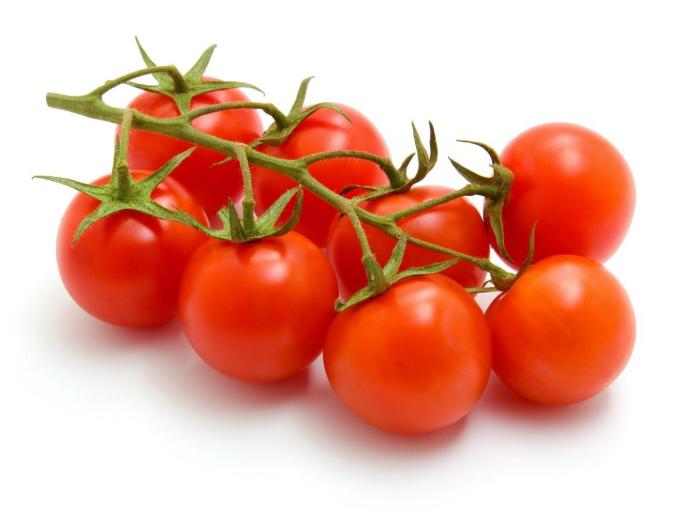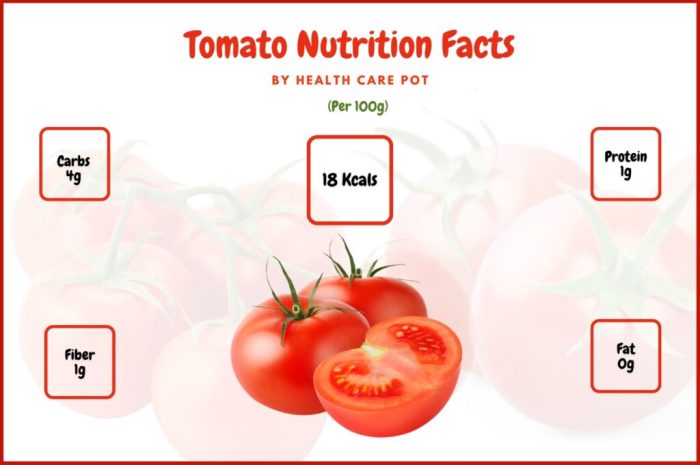Nutritional Composition of 100g Cherry Tomatoes
Cherry tomatoes nutrition facts 100g – Yo, let’s break down the nutritional power packed into those tiny, delicious cherry tomatoes. We’re talking 100 grams, straight up. These little guys aren’t just cute; they’re seriously good for you. Get ready to level up your snack game with some serious knowledge.
Macronutrient Breakdown of 100g Cherry Tomatoes
Cherry tomatoes are low-cal and mostly water, which is totally rad. But don’t sleep on the nutrients they
do* pack. Here’s the lowdown on the macros
carbs, protein, and fats. Remember, these values are approximate and can vary slightly depending on the variety and growing conditions.
| Nutrient | Amount (grams) | Amount (%) | Daily Value (%) |
|---|---|---|---|
| Carbohydrates | 2.6 | ~1% | ~1% |
| Protein | 0.9 | ~2% | ~2% |
| Fat | 0.2 | ~0.3% | ~0.3% |
Note: Daily Value percentages are based on a 2000 calorie diet. These are estimates, and your individual needs may vary.
Micronutrient Content of 100g Cherry Tomatoes
Okay, now for the real MVPs – the micronutrients! These are the vitamins and minerals that keep your body running like a well-oiled machine. Cherry tomatoes are seriously stacked with these good guys.
- Vitamin C: A major player in boosting your immune system. Cherry tomatoes are a solid source.
- Vitamin A: Crucial for vision and overall health. You’ll find a decent amount in these little red bombs.
- Vitamin K: Important for blood clotting and bone health. Cherry tomatoes contribute a bit to your daily needs.
- Potassium: Helps regulate blood pressure. A good amount is packed into these tasty treats.
- Manganese: Essential for bone health and metabolism. Cherry tomatoes provide a small but significant amount.
- Lycopene: This powerful antioxidant is what gives cherry tomatoes their vibrant red color and is linked to various health benefits.
Fiber Content and Digestive Health in 100g Cherry Tomatoes
Fiber is the unsung hero of digestion. It keeps things moving smoothly, prevents constipation, and can even help regulate blood sugar levels. Cherry tomatoes contain a decent amount of fiber, contributing to your daily intake and overall gut health. While the exact amount varies slightly depending on the tomato variety and ripeness, a serving of 100g contributes a noticeable amount to a healthy digestive system.
Think of it as a tiny but mighty cleanup crew for your insides.
Health Benefits Associated with Cherry Tomato Consumption: Cherry Tomatoes Nutrition Facts 100g

Yo, let’s get real about the awesome health perks of chowing down on cherry tomatoes. These tiny powerhouses are packed with nutrients that seriously level up your well-being. From boosting your immune system to protecting your heart, cherry tomatoes are a total game-changer.
Antioxidant Properties and Oxidative Stress Reduction, Cherry tomatoes nutrition facts 100g
Cherry tomatoes are loaded with antioxidants, like lycopene, beta-carotene, and vitamin C. These bad boys fight off those pesky free radicals, which are unstable molecules that can damage your cells and contribute to aging and disease. By reducing oxidative stress, cherry tomatoes help protect your body from damage at a cellular level, keeping you feeling and looking your best.
A 100g serving of cherry tomatoes offers a significant boost of vitamins and antioxidants, a stark contrast to the sugar rush found in many carbonated drinks. For instance, comparing this nutritional profile to the high sugar content and caffeine kick detailed in the mountain dew voltage nutrition facts highlights the considerable difference in their health impacts. Ultimately, choosing cherry tomatoes contributes to a healthier diet compared to sugary soft drinks.
Think of it as your body’s natural defense system getting a serious upgrade.
Cherry Tomatoes and Cardiovascular Health
Your heart will thank you for adding cherry tomatoes to your diet. The potassium in cherry tomatoes helps regulate blood pressure, a major factor in heart health. Plus, the fiber content aids in lowering cholesterol levels. Lycopene, that star antioxidant, also plays a key role in protecting your heart by reducing inflammation and improving blood vessel function.
Basically, cherry tomatoes are like tiny, delicious cardio-protectors. Studies have shown a correlation between increased lycopene intake and a reduced risk of cardiovascular disease.
Cherry Tomatoes and Immune Function
Want a stronger immune system? Cherry tomatoes are your new best friend. They’re brimming with vitamin C, a crucial nutrient for immune cell function. Vitamin C helps your body produce white blood cells, the soldiers that fight off infections. Furthermore, the antioxidants in cherry tomatoes help protect your immune cells from damage, keeping them ready to tackle any invaders.
Research indicates that diets rich in antioxidants are associated with a lower risk of getting sick.
Benefits for Eye and Skin Health
Let’s talk about looking and feeling your best.
- Eye Health: The vitamins and antioxidants in cherry tomatoes, especially lutein and zeaxanthin, contribute to eye health by protecting against age-related macular degeneration and cataracts. These nutrients act like sunglasses for your eyes, shielding them from harmful UV light and oxidative stress.
- Skin Health: Lycopene, that amazing antioxidant again, gives cherry tomatoes their vibrant red color and contributes to healthy skin. It protects your skin from sun damage and helps maintain its elasticity and youthful appearance. Think of it as a natural, delicious skincare boost from the inside out.
Visual Representation of Nutritional Information

Yo, let’s get real about picturing what 100 grams of cherry tomatoes actually looks like and breaking down their nutritional makeup. We’re talking about the visual vibe and a word-picture of the macronutrient breakdown – no actual images needed, fam.Cherry tomatoes are, like, super tiny. A 100g serving is a decent-sized handful, probably around 20-25 of those little guys.
Think vibrant red, maybe a few with hints of orange or even yellow if you’re feeling fancy. They’re plump and round, like miniature jewels, and their skins are smooth and glossy. Imagine the perfect little spheres, glistening slightly, packed together in a small bowl. They’re not uniform in size; some might be a tad bigger, others a bit smaller, but all radiating that juicy, fresh-from-the-vine energy.
Macronutrient Proportions in 100g of Cherry Tomatoes
Okay, so picture this: you’ve got this handful of cherry tomatoes. Now, let’s break down the major players in their nutritional profile, using a word-based visual. Imagine a pie chart, but we’re describing it with words, not drawing it. The biggest slice of this pie – easily the largest – is water. Seriously, cherry tomatoes are mostly water, so think of a huge, juicy wedge dominating the chart.
Next, you’ve got a smaller, but still significant, slice representing carbohydrates. This is mostly sugars, so think of it as a sweet, but not overly large, section. Then you have a tiny sliver for protein – it’s there, but super small compared to the others. Finally, you’ve got an even tinier sliver for fats – it’s practically negligible, so think of it as a microscopic speck in the grand scheme of things.
The majority of the visual representation is dominated by that massive water wedge, with carbs taking up a decent chunk, and protein and fats being barely visible. It’s a pretty straightforward picture: mostly water, then carbs, with barely any protein or fat.
FAQ Overview
Are cherry tomatoes a good source of antioxidants?
Yes! Cherry tomatoes are rich in lycopene, a powerful antioxidant linked to various health benefits.
Can I eat cherry tomatoes raw?
Absolutely! They’re delicious eaten straight from the vine, making a perfect healthy snack.
How many cherry tomatoes equal 100g?
The exact number varies depending on size, but roughly 20-25 medium-sized cherry tomatoes should equal about 100g.
Are cherry tomatoes good for weight loss?
Their low calorie and high nutrient content makes them a great addition to a weight-loss diet. They promote satiety too.



